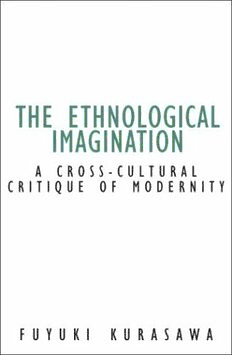Download The ethnological imagination: a cross-cultural critique of modernity PDF Free - Full Version
Download The ethnological imagination: a cross-cultural critique of modernity by Fuyuki Kurasawa in PDF format completely FREE. No registration required, no payment needed. Get instant access to this valuable resource on PDFdrive.to!
About The ethnological imagination: a cross-cultural critique of modernity
Fuyuki Kurasawa unearths what he terms "the ethnological imagination," a substantial countercurrent of thought that interprets and contests Western modernity’s existing social order through comparison and contrast to a non-Western other. Accordingly, Kurasawa traces and critiques, through this prism of cultural alterity, the writings of some of the key architects of this way of thinking: Jean-Jacques Rousseau, Karl Marx, Max Weber, Émile Durkheim, Claude Lévi-Strauss, and Michel Foucault. In the work of these thinkers, Kurasawa finds little justification for two of the most prevalent claims about social theory: the wholesale "postmodern" dismissal of the social-theoretical enterprise because of its supposedly intractable ethnocentrism and imperialism, or, on the other hand, the traditionalist and historicist revival of a canon stripped of its intercultural foundations. Rather, Kurasawa’s book defends a cultural perspective that eschews both the false universalism of "end of history" scenarios and the radical particularism embodied in the vision of "the clash of civilizations." It contends that the ethnological imagination can invigorate critical social theory by informing its response to an increasingly multicultural world—a response that calls for a reconsideration of the identity and boundaries of the West as well of modernity itself. Fuyuki Kurasawa is assistant professor of sociology at York University, Toronto. He was named a Young Canadian Leader by the Globe and Mail newspaper in 2000.
Detailed Information
| Author: | Fuyuki Kurasawa |
|---|---|
| Publication Year: | 2004 |
| ISBN: | 9780816642403 |
| Pages: | 133 |
| Language: | English |
| File Size: | 16.796 |
| Format: | |
| Price: | FREE |
Safe & Secure Download - No registration required
Why Choose PDFdrive for Your Free The ethnological imagination: a cross-cultural critique of modernity Download?
- 100% Free: No hidden fees or subscriptions required for one book every day.
- No Registration: Immediate access is available without creating accounts for one book every day.
- Safe and Secure: Clean downloads without malware or viruses
- Multiple Formats: PDF, MOBI, Mpub,... optimized for all devices
- Educational Resource: Supporting knowledge sharing and learning
Frequently Asked Questions
Is it really free to download The ethnological imagination: a cross-cultural critique of modernity PDF?
Yes, on https://PDFdrive.to you can download The ethnological imagination: a cross-cultural critique of modernity by Fuyuki Kurasawa completely free. We don't require any payment, subscription, or registration to access this PDF file. For 3 books every day.
How can I read The ethnological imagination: a cross-cultural critique of modernity on my mobile device?
After downloading The ethnological imagination: a cross-cultural critique of modernity PDF, you can open it with any PDF reader app on your phone or tablet. We recommend using Adobe Acrobat Reader, Apple Books, or Google Play Books for the best reading experience.
Is this the full version of The ethnological imagination: a cross-cultural critique of modernity?
Yes, this is the complete PDF version of The ethnological imagination: a cross-cultural critique of modernity by Fuyuki Kurasawa. You will be able to read the entire content as in the printed version without missing any pages.
Is it legal to download The ethnological imagination: a cross-cultural critique of modernity PDF for free?
https://PDFdrive.to provides links to free educational resources available online. We do not store any files on our servers. Please be aware of copyright laws in your country before downloading.
The materials shared are intended for research, educational, and personal use in accordance with fair use principles.

